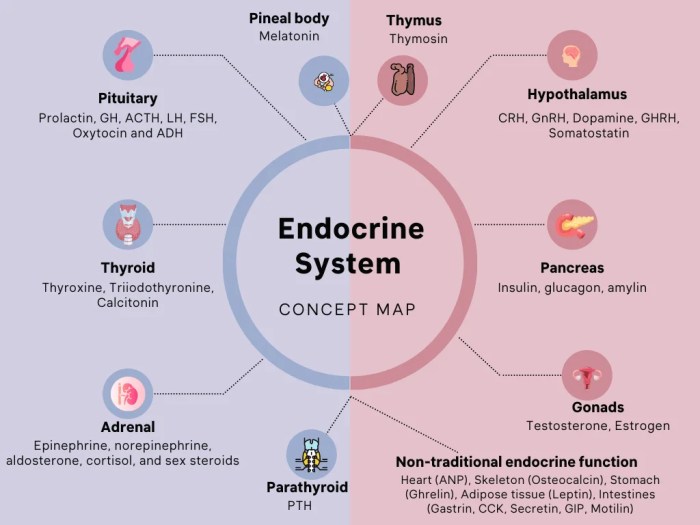Dive into the depths of endocrinology with our comprehensive Endocrine System Exam Questions PDF. This invaluable resource empowers you to master the intricacies of the endocrine system, equipping you with a profound understanding of its functions, disorders, and clinical assessment.
Delve into the complexities of hormone production, regulation, and their profound impact on various physiological processes. Explore the diverse array of endocrine glands and their specific roles, unraveling the mechanisms that orchestrate hormonal balance.
Understanding the Endocrine System
The endocrine system is a complex network of glands that produce and secrete hormones, chemical messengers that regulate various bodily functions. Hormones travel through the bloodstream to target organs and tissues, where they exert their effects.
The endocrine system plays a crucial role in maintaining homeostasis, growth and development, reproduction, metabolism, and energy balance. It consists of several endocrine glands, including the pituitary gland, thyroid gland, adrenal glands, pancreas, ovaries (in females), and testes (in males).
Hormones are produced in response to specific stimuli and are regulated by negative feedback loops. When hormone levels reach a certain threshold, the feedback loop signals the gland to reduce hormone production.
Key Hormones and Their Functions: Endocrine System Exam Questions Pdf
- Thyroid hormones (T3 and T4):Regulate metabolism, growth, and development.
- Insulin:Lowers blood glucose levels by promoting glucose uptake into cells.
- Glucagon:Raises blood glucose levels by stimulating glucose release from the liver.
- Adrenaline (epinephrine):Prepares the body for “fight or flight” response by increasing heart rate and blood pressure.
- Cortisol:Regulates stress response, metabolism, and immune function.
- Estrogen and progesterone (in females):Regulate the menstrual cycle and prepare the body for pregnancy.
- Testosterone (in males):Promotes muscle mass, bone density, and sperm production.
Endocrine Disorders

- Hyperthyroidism:Overproduction of thyroid hormones, leading to weight loss, anxiety, and rapid heartbeat.
- Hypothyroidism:Underproduction of thyroid hormones, leading to weight gain, fatigue, and dry skin.
- Diabetes:Impaired insulin production or function, leading to elevated blood glucose levels.
- Cushing’s syndrome:Overproduction of cortisol, leading to weight gain, high blood pressure, and diabetes.
Diagnosis of endocrine disorders involves physical examination, medical history, laboratory tests, and imaging techniques such as ultrasound and MRI.
Clinical Assessment of Endocrine Function

Clinical examination includes palpation of the thyroid gland, assessment of blood pressure, and examination of skin and hair texture.
Medical history involves inquiring about symptoms, medications, and family history of endocrine disorders.
Laboratory tests measure hormone levels, glucose levels, and other biomarkers.
Imaging modalities, such as ultrasound and MRI, can visualize endocrine glands and detect abnormalities.
Treatment Options for Endocrine Disorders
Treatment options for endocrine disorders depend on the specific disorder and severity.
- Hormone replacement therapy:Replaces deficient hormones.
- Surgery:Removes enlarged or cancerous glands.
- Medications:Block or stimulate hormone production.
- Lifestyle modifications:Diet, exercise, and stress management can improve symptoms and overall health.
Q&A
What are the key hormones produced by the endocrine system?
The endocrine system produces a wide range of hormones, including insulin, glucagon, thyroid hormones, growth hormone, and sex hormones, each with specific functions and target organs.
How are endocrine disorders diagnosed?
Endocrine disorders are diagnosed through a combination of clinical examination, medical history, laboratory tests, and imaging techniques, such as ultrasound and MRI.
What are the common treatment options for endocrine disorders?
Treatment options for endocrine disorders vary depending on the specific disorder and may include hormone replacement therapy, surgery, medications, and lifestyle modifications, such as diet and exercise.